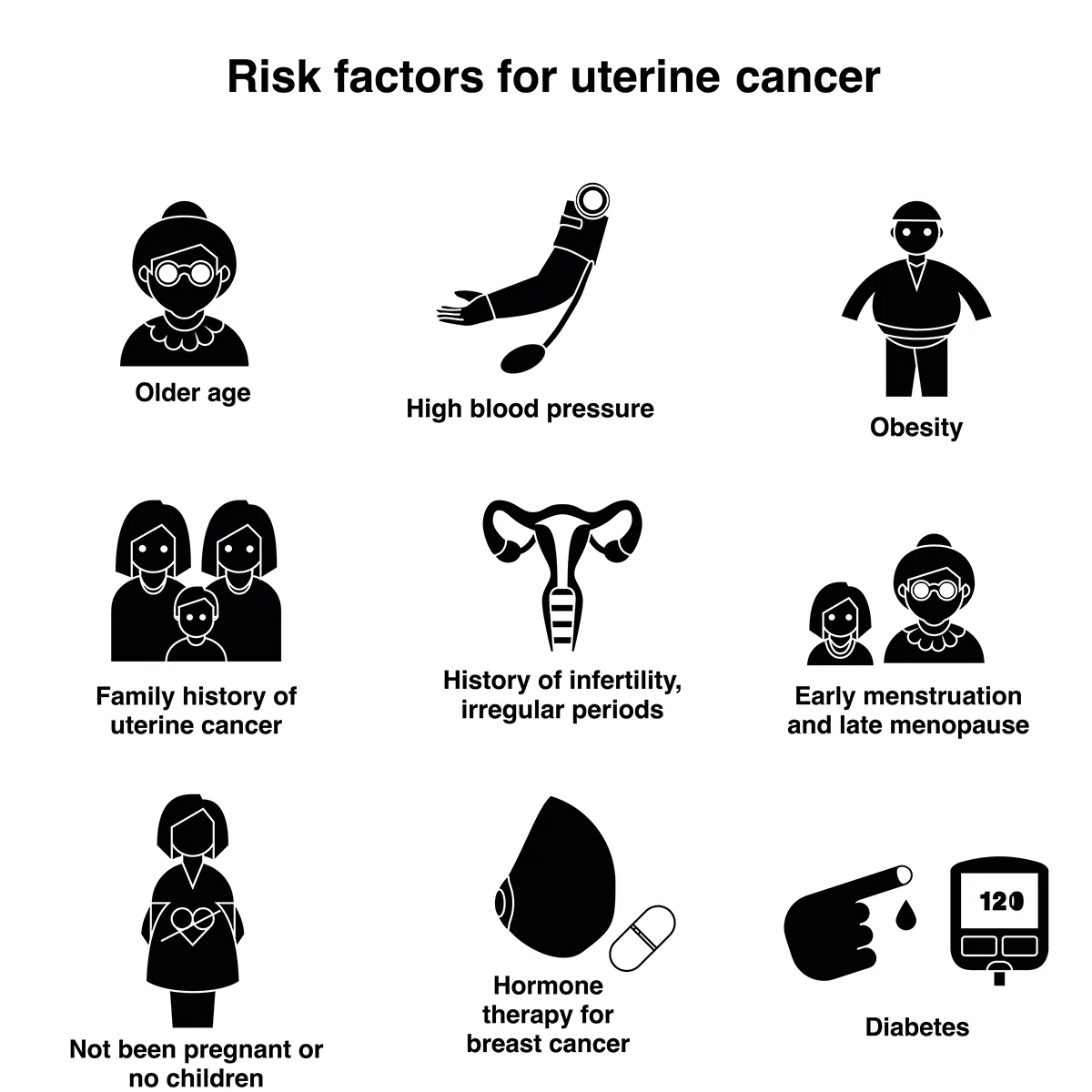Uterine cancer
Find a cancer specialistUterine cancer is one of the most common reproductive cancer types. According to the American Cancer Society, about 3.1% of women will be diagnosed with uterine cancer during their lifetimes.
At Advocate Health Care, our multidisciplinary team of specialists offers a lifelong, comprehensive approach to your care, from prevention and screening to advanced diagnosis and treatment techniques.
Types of uterine cancer
The most common type of uterine cancer is endometrial cancer, which makes up about 95% of cases. It’s so common that medical providers often use the terms interchangeably.
Endometrial cancer grows in the lining of the uterus (endometrium) and is treatable when it’s found early.
Uterine sarcoma is a rarer type of uterine cancer. It grows in the muscle wall of the uterus (myometrium) and is often harder to treat than endometrial cancer.
Uterine cancer symptoms
The first signs of uterine cancer are usually abnormal types of bleeding. It's important to talk with your doctor if you experience unusual bleeding or these potential endometrial cancer or uterine sarcoma symptoms:
- Abnormal vaginal discharge
- Difficulty urinating
- Unexplained weight loss
- Lump in the lower belly
What does uterine cancer feel like?
Some potential symptoms of uterine cancer include feelings of pain or pressure such as:
- Pain, pressure or feeling of fullness in the pelvic area
- Pain during intercourse
- Pain when urinating

Uterine cancer risk factors
White women have a higher risk of developing uterine cancers than women of other races. Younger women with abnormal ovulation and menstruation patterns also face an increased risk of developing uterine cancer.
Additional risk factors include:
- Age over 50
- Early age of menstruation or late age of menopause
- Using estrogen replacement therapy without progesterone
- Having diabetes or obesity
- History of endometrial hyperplasia
- History of breast cancer, ovarian cancer or colon cancer
- History of taking tamoxifen for breast cancer prevention or breast cancer treatment
- Having polycystic ovarian syndrome (PCOS)
Genetic testing can help identify some of your risk factors for uterine cancer and other types of cancer.
Detection & diagnosis of uterine cancer
If you notice any unusual symptoms, it’s important to talk with your primary care physician or gynecologist. Your doctor can determine if your symptoms are related to uterine cancer or to other conditions such as uterine fibroids.
Abnormal vaginal discharge – as well as abnormal vaginal bleeding outside your normal cycle or during menopause – could indicate the need for testing. Some of these tests might include:
- Transvaginal ultrasound, which uses high-frequency soundwaves to create a picture of the uterus and look for changes or tumors.
- Dilation and curettage (D&C) in which the doctor uses an instrument to scrape cells from the lining of the uterus.
- Endometrial biopsy, which uses a flexible tube inserted into the uterus through the cervix to collect a tiny portion of tissue from the uterine lining. The cells are examined under a microscope. If you have risk factors for uterine cancer, your doctor may recommend a yearly endometrial biopsy.
- Hysteroscopy, which uses a small scope inserted into the uterus through the cervix to help the doctor see abnormalities or growths.
- CA-125, a blood test that looks for higher levels of a substance that could indicate the presence of cancer.
Uterine cancer treatments & services
If you’re diagnosed with endometrial cancer, you’ll have some of the best experts by your side. Our team will work with you to create a personalized cancer treatment plan. Your plan will include the latest therapies to help slow the growth of uterine cancer cells.
Treatment options for uterine cancer include surgery, radiation therapy, chemotherapy or hormone therapy.
- We may recommend surgery followed by chemotherapy, radiation therapy or a combination of both to destroy additional uterine cancer cells.
- In some cases, we may use chemotherapy or radiation to shrink your tumor before surgery.
- Hormone therapy slows the growth of endometrial cancer cells by reducing hormones in the body. We may use it alone or with surgery and other therapies.
Support for every step
We’re committed to caring for the whole you and providing the resources you and your loved ones need to manage a cancer diagnosis. You’ll find a full range of free or low-cost cancer support and wellness services to guide you during recovery:
- Educational programs
- Rehabilitation
- Nutritional counseling
- Spiritual counseling
- Support groups
Get care
We help you live well. And we’re here for you in person and online.